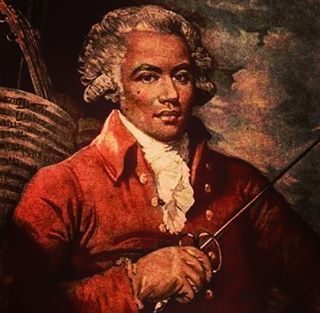The arts have always played a significant role in the history and culture of African descendants. Today, many people often limit the scope of Art within the African Diaspora to hip-hop, R&B, contemporary dance, and other contemporary musical art forms; African descendants have contributed to and played important roles in all art forms, making significant impressions on them.
One of the greatest composers of the early classical period was Joseph Boulogne, also known as Chevalier Saint-Georges, and yet sadly, today, he is almost entirely forgotten today. He was one of the earliest musicians of the European classical tradition to have African ancestry. This son of an enslaved person overcame class, race, and prejudice adversities to become a major musical star all over Europe and inspired both Mozart and Haydn. His works have been largely forgotten and overlooked in history, but his influence and talent remain undeniable.
The composer, conductor, and violin virtuoso Joseph Boulogne was born to an enslaved Senegalese parent and a French colonialist in the French-Caribbean island of Guadeloupe. At age eight, his father moved him and his mother to France, which was remarkable considering the 18th-century view of people of color as enslaved or laborers. In this environment, Boulogne was made to feel unwelcome. He was known for his athletic talents as a swimmer and swordsman, yet white society was appalled and offended at the idea of this great fencer. He was even challenged by the likes of Picarr who referred to him in a derogatory fashion as the “Mulato”. Furthermore, Boulogne was deemed unfit to marry due to the color of his skin. Despite all of these obstacles, he became a celebrated musician, composer, and performer of the 18th century.
Boulogne was a virtuoso violinist, director of Paris’s finest orchestra, and prolific composer. He was among the earliest French composers of string quartets, symphonies concertantes, and quartets concertantes. And yet he was humiliated when he was proposed as music director of the Opera in 1776. Many protested, even though he was talented and the King’s favorite to earn the position. A petition was sent to the queen declaring that “their honor and their delicate conscience could never allow them to submit to the orders of a mulatto.” The position was relatively left vacant (as no one possessed the merits to fulfill the requirements to be the director) rather than allow Boulogne to occupy the position.
Joseph Boulogne was unduly assigned a nickname in the modern-day circles of the classical musical universe, “Le Mozart Noir,” which is more of a derision than a tribute. One might ponder why a musical genius would be given “The Black Mozart” as a nickname; why not call him the great Boulogne? The nickname is used to imply that Mozart’s music is superior to Boulogne’s. And to evoke the sense that Mozart’s work came before that of Boulogne, and the latter was influenced by it when it was the other way around. The arts have invariably played a significant role in the history and culture of all societies, and symbolism matters. Therefore, the nickname was no mistake nor a sincere attempt at honoring him. After all, there is a reason that one might have never heard about him when studying classical music.
The nickname Boulogne was given is a reminder that regardless of how talented a person of color may be, there is always a systematic attempt to make sure they are erased or regarded as inferior to a talented white artist. This is especially consequential in the case of Boulogne, as he was the first man of African descent to lead France’s most important orchestras.
Today, our society is still imbued with contempt for people of color who are exceptionally talented and accomplished. They are only praised when they stay within the boundaries of entertainment and are hated when they challenge the nation’s problems or attempt to disrupt the status quo. History provides many examples of talented people of color who faced similar racism to Boulogne. Olympic runner Jesse Owens was unable to make a living after his fame ebbed, and was only celebrated again when he was used to try to deter Tommie Smith and John Carlos from protesting at the 1968 summer Olympics, an act he later regretted. Similarly, boxer Muhammad Ali was stripped of his titles and right to a job when he took a moral stand against the Vietnam War. He went from being viewed as a hero to a traitor.
More recently, a star quarterback led his team to the Super Bowl and was featured on a video game cover, cheered enthusiastically by fans in San Francisco. But when he took a knee to protest the systematic killing of black men by police, he was no longer seen as a star but a pariah. This further demonstrates the underlying racism in our society.
The most prominent modern expression of hate towards an accomplished person of color was the animosity President Obama received during his eight-year tenure. The first African American president met the same fate as Joseph Boulogne in the 18th century. Despite his impressive credentials – an M.A. from Harvard, a B.A. from Columbia University, teaching constitutional law, and being a great public speaker – Obama was never treated with the decency and respect he deserved. His nationality was questioned, and many whites protested with racist signs that dehumanized him.
There should be more concerted efforts to teach more about all people of color who have accomplished greatness in this world. Only through gaining knowledge of our diverse cultural and historical backgrounds can we pass on the wisdom of our talented artists, writers, scientists, athletes, and more to future generations. The story of Joseph Boulogne, also known as Chevalier de Saint-George, is a significant part of African world history and an inspiration for aspiring artists of color all over the globe, one that we should share and not allow others to erase.

Edwin Rosario Mazara is the founder of Spanglish Voces, a non-profit promoting community building through the arts. He also founded La Sala Talks, an outlet that communicates diverse perspectives within our cultures. Currently serves as a Communications Director at the NY State Senate—an activist who loves reading, la música & conversations & las miles de historias de los desconocidos.



